Understanding the Ruminant Animal Digestive System
Ruminants are hoofed mammals, including cattle, sheep, and goats, with a unique digestive system that allows them to better use energy from fibrous plant material when compared with other herbivores. Unlike monogastrics such as swine and poultry, ruminants have a digestive system designed to ferment feedstuffs and provide precursors for energy for the animal to use. By better understanding how the ruminant digestive system works, livestock producers can better understand how to care for and feed ruminant animals.
Ruminant Digestive Anatomy and Function
The ruminant digestive system uniquely qualifies ruminant animals such as cattle to efficiently use high roughage feedstuffs, including forages. Anatomy of the ruminant digestive system includes the mouth, tongue, salivary glands (producing saliva for buffering rumen pH), esophagus, four-compartment stomach (rumen, reticulum, omasum, and abomasum), pancreas, gall bladder, small intestine (duodenum, jejunum, and ileum), and large intestine (cecum, colon, and rectum).
A ruminant uses its mouth (oral cavity) and tongue to harvest forages during grazing or to consume harvested feedstuffs. Cattle harvest forages during grazing by wrapping their tongues around the plants and then pulling to tear the forage for consumption. On average, cattle take from 25,000 to more than 40,000 prehensile bites to harvest forage while grazing each day. They typically spend more than one-third of their time grazing, one-third of their time ruminating (cud chewing), and slightly less than one-third of their time idling where they are, neither grazing nor ruminating.
The roof of the ruminant mouth is a hard/soft palate without incisors. The lower jaw incisors work against this hard dental pad. The incisors of grass/roughage selectors are wide with a shovel-shaped crown, while those of concentrate selectors are narrower and chisel-shaped. Premolars and molars match between upper and lower jaws. These teeth crush and grind plant material during initial chewing and rumination.
Saliva aids in chewing and swallowing, contains enzymes for breakdown of fat (salivary lipase) and starch (salivary amylase), and is involved in nitrogen recycling to the rumen. Saliva’s most important function is to buffer pH levels in the reticulum and rumen. A mature cow produces up to 50 quarts of saliva per day, but this varies, depending on the amount of time spent chewing feed, because that stimulates saliva production.
Forage and feed mixes with saliva containing sodium, potassium, phosphate, bicarbonate, and urea when consumed, to form a bolus. That bolus then moves from the mouth to the reticulum through a tube-like passage called the esophagus. Muscle contractions and pressure differences carry these substances down the esophagus to the reticulum.
Ruminants eat rapidly, swallowing much of their feedstuffs without chewing it sufficiently (< 1.5 inches). The esophagus functions bidirectionally in ruminants, allowing them to regurgitate their cud for further chewing, if necessary. The process of rumination or “chewing the cud” is when forage and other feedstuffs are forced back to the mouth for further chewing and mixing with saliva. This cud is then swallowed again and passed into the reticulum. Then the solid portion slowly moves into the rumen for fermentation, while most of the liquid portion rapidly moves from the reticulorumen into the omasum and then abomasum. The solid portion left behind in the rumen typically remains for up to 48 hours and forms a dense mat in the rumen, where microbes can use the fibrous feedstuffs to make precursors for energy.
True ruminants, such as cattle, sheep, goats, deer, and antelope, have one stomach with four compartments: the rumen, reticulum, omasum, and abomasums. The ruminant stomach occupies almost 75 percent of the abdominal cavity, filling nearly all of the left side and extending significantly into the right side. The relative size of the four compartments is as follows: the rumen and reticulum comprise 84 percent of the volume of the total stomach, the omasum 12 percent, and the abomasum 4 percent. The rumen is the largest stomach compartment, holding up to 40 gallons in a mature cow.
The reticulum holds approximately 5 gallons in the mature cow. Typically, the rumen and reticulum are considered one organ because they have similar functions and are separated only by a small muscular fold of tissue. They are collectively referred to as the reticulorumen. The omasum and abomasum hold up to 15 and 7 gallons, respectively, in the mature cow.
The reticulorumen is home to a population of microorganisms (microbes or “rumen bugs”) that include bacteria, protozoa, and fungi. These microbes ferment and break down plant cell walls into their carbohydrate fractions and produce volatile fatty acids (VFAs), such as acetate (used for fat synthesis), priopionate (used for glucose synthesis), and butyrate from these carbohydrates. The animal later uses these VFAs for energy.
The reticulum is called the “honeycomb” because of the honeycomb appearance of its lining. It sits underneath and toward the front of the rumen, lying against the diaphragm. Ingesta flow freely between the reticulum and rumen. The main function of the reticulum is to collect smaller digesta particles and move them into the omasum, while the larger particles remain in the rumen for further digestion.
The reticulum also traps and collects heavy/dense objects the animal consumes. When a ruminant consumes a nail, wire, or other sharp heavy object, it is very likely the object will be caught in the reticulum. During normal digestive tract contractions, this object can penetrate the reticulum wall and make its way to the heart, where it can lead to hardware disease. The reticulum is sometimes referred to as the “hardware stomach.” Hardware disease is discussed in detail in Extension Publication 2519 Beef Cattle Nutritional Disorders.
The rumen is sometimes called the “paunch.” It is lined with papillae for nutrient absorption and divided by muscular pillars into the dorsal, ventral, caudodorsal, and caudoventral sacs. The rumen acts as a fermentation vat by hosting microbial fermentation. About 50 to 65 percent of starch and soluble sugar consumed is digested in the rumen. Rumen microorganisms (primarily bacteria) digest cellulose from plant cell walls, digest complex starch, synthesize protein from nonprotein nitrogen, and synthesize B vitamins and vitamin K. Rumen pH typically ranges from 6.5 to 6.8. The rumen environment is anaerobic (without oxygen). Gases produced in the rumen include carbon dioxide, methane, and hydrogen sulfide. The gas fraction rises to the top of the rumen above the liquid fraction.
The omasum is spherical and connected to the reticulum by a short tunnel. It is called the “many piles” or the “butcher’s bible” in reference to the many folds or leaves that resemble pages of a book. These folds increase the surface area, which increases the area that absorbs nutrients from feed and water. Water absorption occurs in the omasum. Cattle have a highly developed, large omasum.
The abomasum is the “true stomach” of a ruminant. It is the compartment that is most similar to a stomach in a nonruminant. The abomasum produces hydrochloric acid and digestive enzymes, such as pepsin (breaks down proteins), and receives digestive enzymes secreted from the pancreas, such as pancreatic lipase (breaks down fats). These secretions help prepare proteins for absorption in the intestines. The pH in the abomasum generally ranges from 3.5 to 4.0. The chief cells in the abomasum secrete mucous to protect the abomasal wall from acid damage.
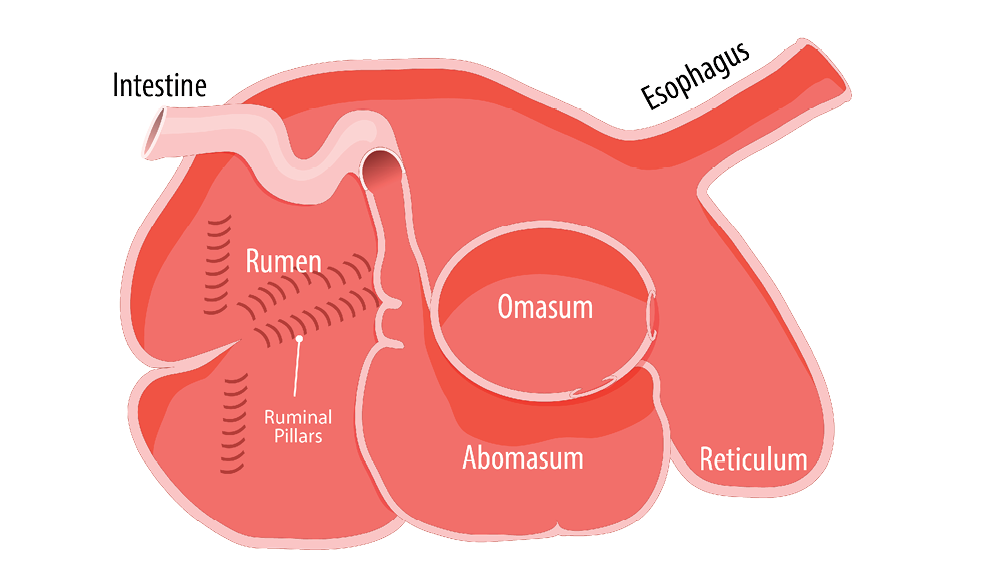
The small and large intestines follow the abomasum as further sites of nutrient absorption. The small intestine is a tube up to 150 feet long with a 20-gallon capacity in a mature cow. Digesta entering the small intestine mix with secretions from the pancreas and liver, which elevate the pH from 2.5 to between 7 and 8. This higher pH is needed for enzymes in the small intestine to work properly. Bile from the gall bladder is secreted into the first section of the small intestine, the duodenum, to aid in digestion. Active nutrient absorption occurs throughout the small intestine, including rumen bypass protein absorption. The intestinal wall contains numerous “finger-like” projections called villi that increase intestinal surface area to aid in nutrient absorption. Muscular contractions aid in mixing digesta and moving it to the next section.
The large intestine absorbs water from material passing through it and then excretes the remaining material as feces from the rectum. The cecum is a large blind pouch at the beginning of the large intestine, approximately 3 feet long with a 2-gallon capacity in the mature cow. The cecum serves little function in a ruminant, unlike its role in horses. The colon is the site of most of the water absorption in the large intestine.
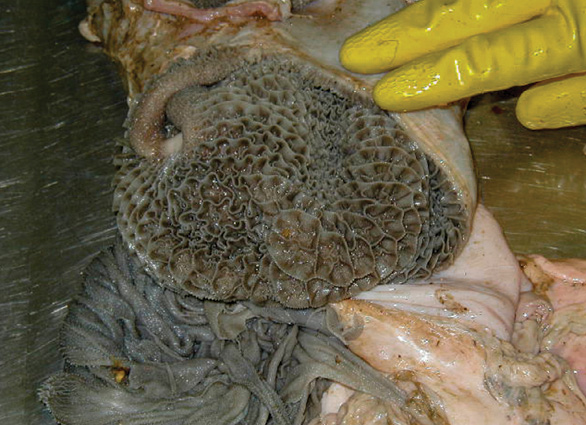
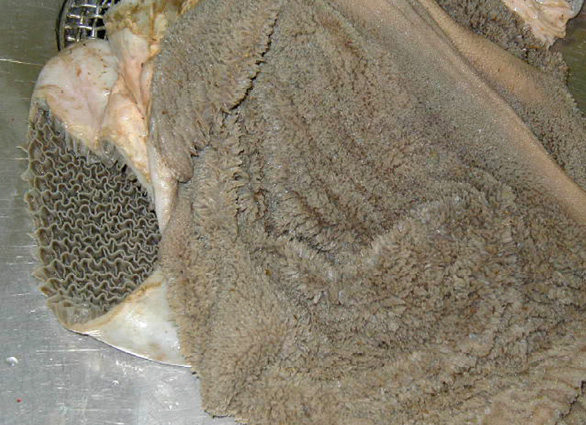
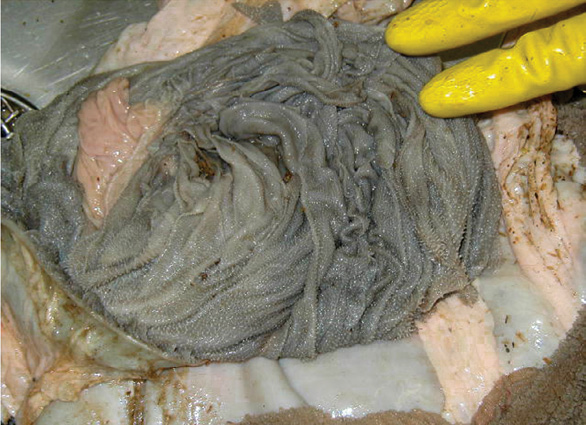
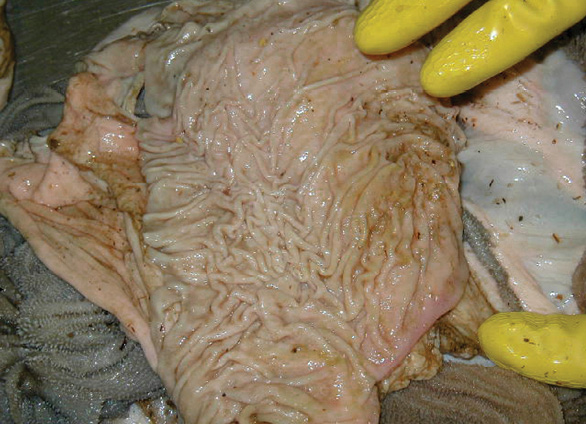
Ruminant Digestive Development
Immature ruminants, such as young, growing calves from birth to about 2 to 3 months of age, are functionally nonruminants. The reticular groove (sometimes referred to as esophageal groove) in these young animals is formed by muscular folds of the reticulum. It shunts milk directly to the omasum and then abomasum, bypassing the reticulorumen. The rumen in these animals must be inoculated with rumen microorganisms, including bacteria, fungi, and protozoa. This is thought to be accomplished through mature ruminants licking calves and environmental contact with these microorganisms.
Immature ruminants must undergo reticulorumen-omasal growth, including increases in volume and muscle. In a calf at birth, the abomasum is the largest compartment of the stomach, making up more than 50 percent of the total stomach area. The reticulorumen and omasum account for 35 percent and 14 percent of the total stomach area in the newborn calf. As ruminants develop, the reticulorumen and omasum grow rapidly and account for increasing proportions of the total stomach area. In mature cattle, the abomasum encompasses only 21 percent of the total stomach capacity, whereas the reticulorumen and omasum make up 62 and 24 percent, respectively, of the total stomach area. Rumen papillae (sites of nutrient absorption) lengthen and decrease in numbers as part of rumen development.
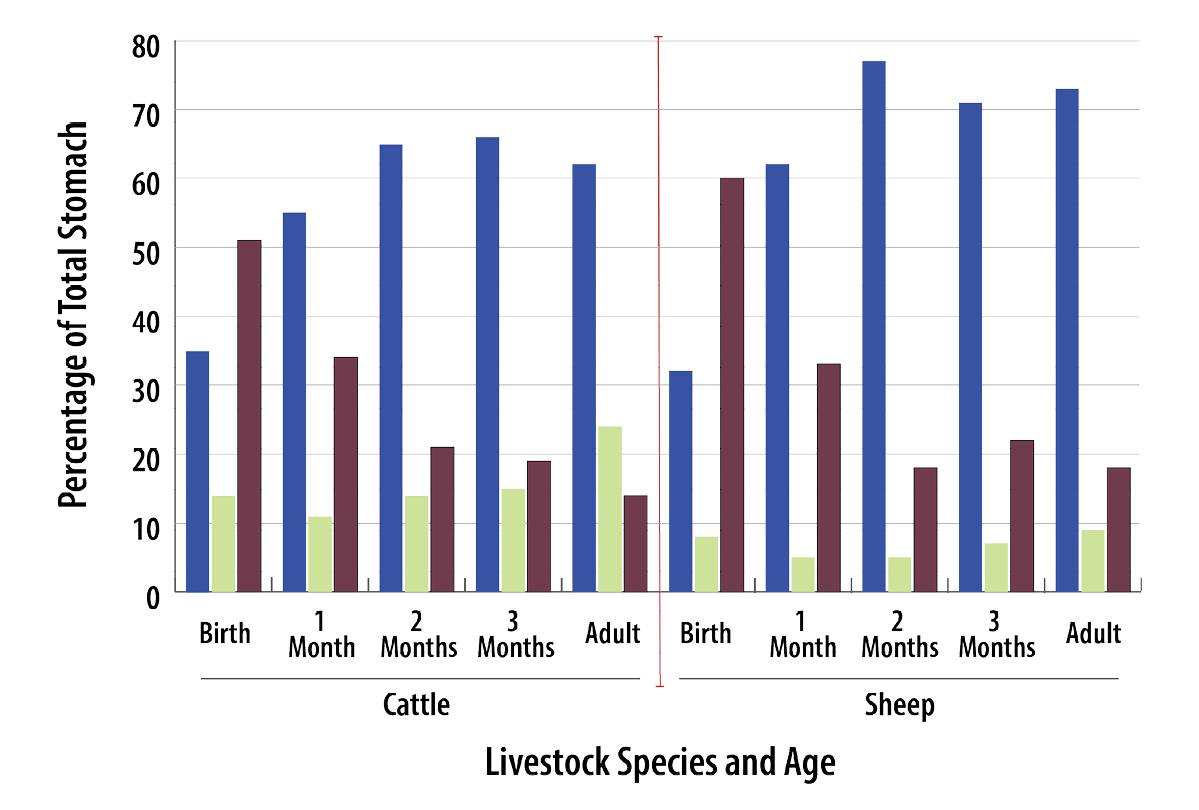
Because immature ruminants do not have a functional rumen, feeding recommendations differ for developing ruminants compared with adult ruminants. For instance, it is recommended immature ruminants are not allowed access to feeds containing non-protein nitrogen such as urea. Developing ruminants are also more sensitive to gossypol and dietary fat levels than mature ruminants. Design nutritional programs for ruminants considering animal age.
Ruminant Feeding Types
Based on the diets they prefer, ruminants can be classified into distinct feeding types: concentrate selectors, grass/roughage eaters, and intermediate types. The relative sizes of various digestive system organs differ by ruminant feeding type, creating differences in feeding adaptations. Knowledge of grazing preferences and adaptations among ruminant livestock species helps in planning grazing systems for each individual species and for multiple species grazed together or on the same acreage.
Concentrate selectors have a small reticulorumen in relation to body size and selectively browse trees and shrubs. Deer and giraffes are examples of concentrate selectors. Animals in this group of ruminants select plants and plant parts high in easily digestible, nutrient dense substances such as plant starch, protein, and fat. For example, deer prefer legumes over grasses. Concentrate selectors are very limited in their ability to digest the fibers and cellulose in plant cell walls.
Grass/roughage eaters (bulk and roughage eaters) include cattle and sheep. These ruminants depend on diets of grasses and other fibrous plant material. They prefer diets of fresh grasses over legumes but can adequately manage rapidly fermenting feedstuffs. Grass/roughage eaters have much longer intestines relative to body length and a shorter proportion of large intestine to small intestine as compared with concentrate selectors.
Goats are classified as intermediate types and prefer forbs and browse such as woody, shrubby type plants. This group of ruminants has adaptations of both concentrate selectors and grass/roughage eaters. They have a fair though limited capacity to digest cellulose in plant cell walls.
Carbohydrate Digestion
Forages
On high-forage diets ruminants often ruminate or regurgitate ingested forage. This allows them to “chew their cud” to reduce particle size and improve digestibility. As ruminants are transitioned to higher concentrate (grain-based) diets, they ruminate less.
Once inside the reticulorumen, forage is exposed to a unique population of microbes that begin to ferment and digest the plant cell wall components and break these components down into carbohydrates and sugars. Rumen microbes use carbohydrates along with ammonia and amino acids to grow. The microbes ferment sugars to produce VFAs (acetate, propionate, butyrate), methane, hydrogen sulfide, and carbon dioxide. The VFAs are then absorbed across the rumen wall, where they go to the liver.
Once at the liver, the VFAs are converted to glucose via gluconeogenesis. Because plant cell walls are slow to digest, this acid production is very slow. Coupled with routine rumination (chewing and rechewing of the cud) that increases salivary flow, this makes for a rather stable pH environment (around 6).
High-Concentrate Feedstuffs (Grains)
When ruminants are fed high-grain or concentrate rations, the digestion process is similar to forage digestion, with a few exceptions. Typically, on a high-grain diet, there is less chewing and ruminating, which leads to less salivary production and buffering agents’ being produced. Additionally, most grains have a high concentration of readily digestible carbohydrates, unlike the more structural carbohydrates found in plant cell walls. This readily digestible carbohydrate is rapidly digested, resulting in an increase in VFA production.
The relative concentrations of the VFAs are also changed, with propionate being produced in the greatest quantity, followed by acetate and butyrate. Less methane and heat are produced as well. The increase in VFA production leads to a more acidic environment (pH 5.5). It also causes a shift in the microbial population by decreasing the forage using microbial population and potentially leading to a decrease in digestibility of forages.
Lactic acid, a strong acid, is a byproduct of starch fermentation. Lactic acid production, coupled with the increased VFA production, can overwhelm the ruminant’s ability to buffer and absorb these acids and lead to metabolic acidosis. The acidic environment leads to tissue damage within the rumen and can lead to ulcerations of the rumen wall. Take care to provide adequate forage and avoid situations that might lead to acidosis when feeding ruminants high-concentrate diets. Acidosis is discussed in detail in Extension Publication 2519 Beef Cattle Nutritional Disorders. In addition, energy as a nutrient in ruminant diets is discussed in detail in Extension Publication 2504 Energy in Beef Cattle Diets.
Protein Digestion
Two sources of protein are available for the ruminant to use: protein from feed and microbial protein from the microbes that inhabit its rumen. A ruminant is unique in that it has a symbiotic relationship with these microbes. Like other living creatures, these microbes have requirements for protein and energy to facilitate growth and reproduction. During digestive contractions, some of these microorganisms are “washed” out of the rumen into the abomasum where they are digested like other proteins, thereby creating a source of protein for the animal.
All crude protein (CP) the animal ingests is divided into two fractions, degradable intake protein (DIP) and undegradable intake protein (UIP, also called “rumen bypass protein”). Each feedstuff (such as cottonseed meal, soybean hulls, and annual ryegrass forage) has different proportions of each protein type. Rumen microbes break down the DIP into ammonia (NH3) amino acids, and peptides, which are used by the microbes along with energy from carbohydrate digestion for growth and reproduction.
Excess ammonia is absorbed via the rumen wall and converted into urea in the liver, where it returns in the blood to the saliva or is excreted by the body. Urea toxicity comes from overfeeding urea to ruminants. Ingested urea is immediately degraded to ammonia in the rumen.
When more ammonia than energy is available for building protein from the nitrogen supplied by urea, the excess ammonia is absorbed through the rumen wall. Toxicity occurs when the excess ammonia overwhelms the liver’s ability to detoxify it into urea. This can kill the animal. However, with sufficient energy, microbes use ammonia and amino acids to grow and reproduce.
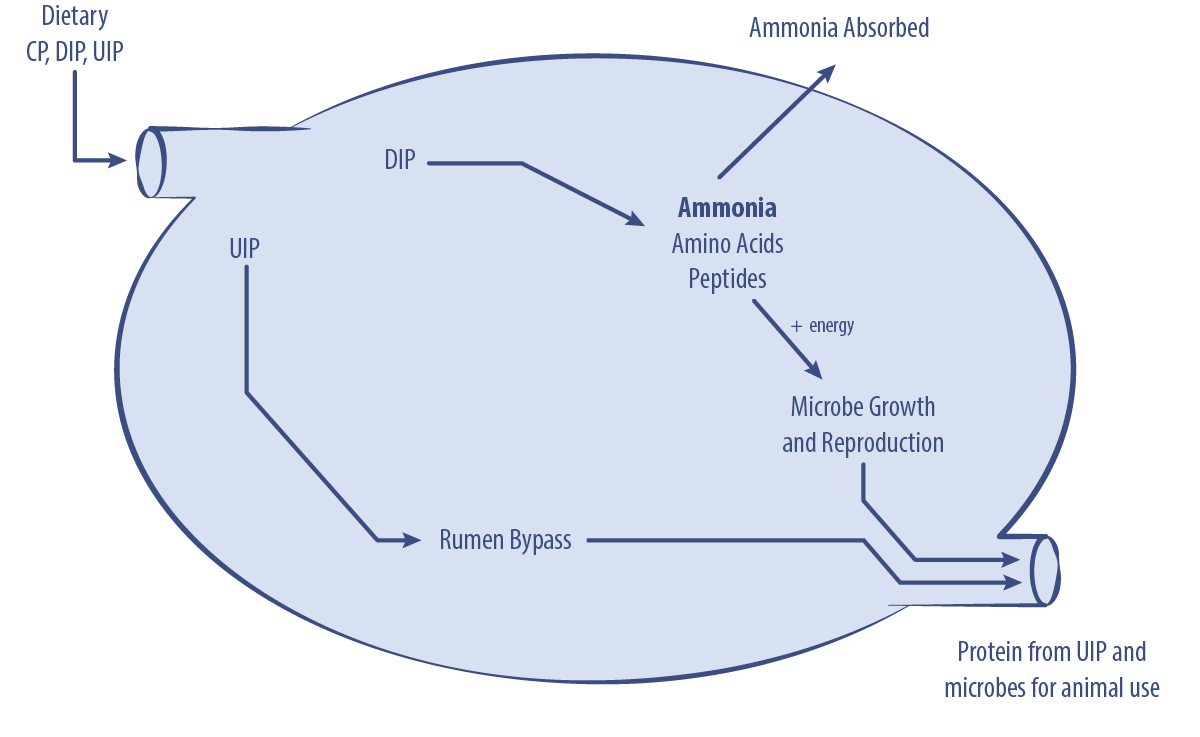
The rumen does not degrade the UIP component of feedstuffs. The UIP “bypasses” the rumen and makes its way from the omasum to the abomasum. In the abomasum, the ruminant uses UIP along with microorganisms washed out of the rumen as a protein source. Protein as a nutrient in ruminant diets is discussed in detail in Extension Publication 2499 Protein in Beef Cattle Diets.
Importance of Ruminant Livestock
The digestive system of ruminants optimizes use of rumen microbe fermentation products. This adaptation lets ruminants use resources (such as high-fiber forage) that cannot be used by or are not available to other animals. Ruminants are in a unique position of being able to use such resources that are not in demand by humans but in turn provide man with a vital food source. Ruminants are also useful in converting vast renewable resources from pasture into other products for human use such as hides, fertilizer, and other inedible products (such as horns and bone).
One of the best ways to improve agricultural sustainability is by developing and using effective ruminant livestock grazing systems. More than 60 percent of the land area in the world is too poor or erodible for cultivation but can become productive when used for ruminant grazing. Ruminant livestock can use land for grazing that would otherwise not be suitable for crop production. Ruminant livestock production also complements crop production, because ruminants can use the byproducts of crop systems not in demand for human use or consumption. Developing a good understanding of ruminant digestive anatomy and function can help livestock producers better plan appropriate nutritional programs and properly manage ruminant animals in various production systems.
References
Church, D. C. (Ed.). (1993). The ruminant animal: Digestive physiology and nutrition. Prospect Heights, IL: Waveland Press, Inc.
Oltjen, J. W., & Beckett, J. L. (1996). Role of ruminant livestock in sustainable agricultural systems. Journal of Animal Science, 74(6), 1406-1409.
Parish, J. A., McCann, M. A., Watson, R. H., Paiva, N. N., Hoveland, C. S., Parks, A. H., Upchurch, B. L., Hill, N. S., & Bouton, J. H. (2003). Use of non-ergot alkaloid-producing endophytes for alleviating tall fescue toxicosis in stocker cattle. Journal of Animal Science, 81(11), 2856-2868.
Van Soest, P. J. (1987). Nutritional ecology of the ruminant. Ithaca, NY: Cornell University Press.
The information given here is for educational purposes only. References to commercial products, trade names, or suppliers are made with the understanding that no endorsement is implied and that no discrimination against other products or suppliers is intended.
Publication 2503 (POD-08-23)
Reviewed by Brandi Karisch, PhD, Associate Extension/Research Professor, Animal and Dairy Sciences. Written by Jane A. Parish, PhD, Professor and Head, North Mississippi Research and Extension Center; J. Daniel Rivera, PhD, former Associate Extension/Research Professor, South Mississippi Branch Experiment Station; and Holly T. Boland, PhD, former Assistant Research/Extension Professor, Animal and Dairy Sciences. Photos of ruminant digestive system courtesy of Stephanie R. Hill, PhD, former Assistant Research Professor, Animal and Dairy Sciences.
The Mississippi State University Extension Service is working to ensure all web content is accessible to all users. If you need assistance accessing any of our content, please email the webteam or call 662-325-2262.




